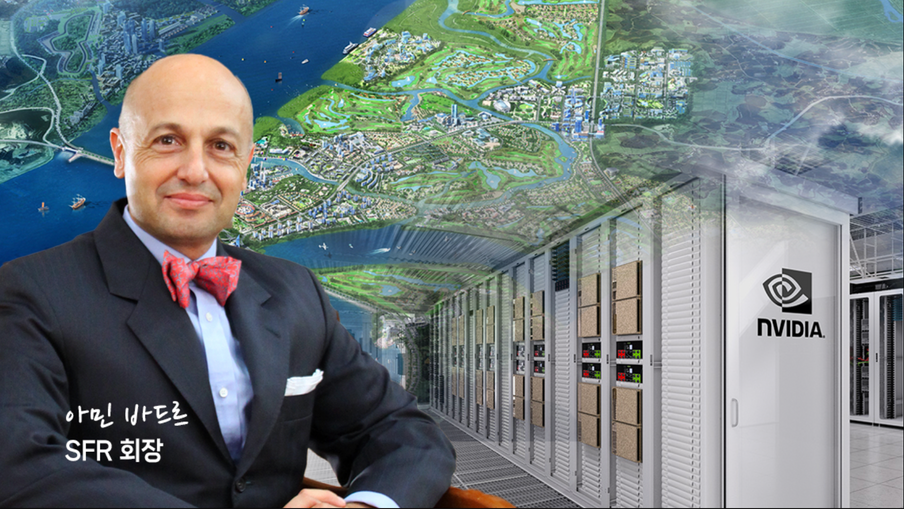Why SFR Targets Korea as Asia's AI Infrastructure Hub

[AI Infrastructure Revolution] SFR Chairman Amin Bard Exclusive Interview
The initial 100MW is $1B~$2B, future investment of $10 bB
Introducing NVIDIA's next-generation AI platform
Global investment firm Stock Farm Road has identified South Korea as the centerpiece of its Asian expansion strategy, announcing plans to develop what it calls a "global sovereign AI hub" anchored by data centers equipped with Nvidia Corp.'s most advanced artificial intelligence platform.
The transnational investment group, which operates across the Middle East, Europe and the United States, is betting that Korea's electrical grid infrastructure and technological capabilities position it uniquely for the next phase of AI development, according to Chairman Amin Badr-El-Din.
"Currently, there are only two grids in the world that can handle the rapid power fluctuations of AI data centers: Korea and the grid we built in Abu Dhabi," Dr. Badr-El-Din said in an interview. He holds dual British-Jordanian citizenship and earned his Ph.D. in electrical engineering from Stanford University.
The investment strategy unfolds in three phases, beginning with a 100-megawatt sovereign AI infrastructure facility, expanding to 400MW in the second phase, and ultimately scaling to 3 gigawatts to serve major AI service operators including Google, Microsoft and OpenAI.
Stock Farm Road(SFR) signed a memorandum of understanding in February to establish an AI supercluster on nearly 4 million square meters in Jeollanam-do Province's Haenam County. The facility will house AI computing infrastructure, data centers and large-scale energy storage systems.

Nvidia Partnership Central to Strategy
The project's distinguishing feature lies in its partnership with Nvidia, which has made a strategic investment in SFR and will participate in data center design and operations. The facility might be the first in Asia to deploy Nvidia's 'Vera Rubin' platform, scheduled for shipment in the second half of 2026.
The next-generation system combines Nvidia's Vera CPU with its Rubin GPU, delivering 2 to 2.5 times the inference performance of the current Blackwell platform. The integrated system supports up to 50 petaflops of performance and incorporates advanced memory and networking technologies including HBM4 and NV-Link 6.
Dr. Badr-El-Din said, referring to Nvidia's plan "We will deploy the latest GPU chipset platform for the first time in Asia, even one year and six months ahead of Google."
Nvidia internally refers to the Korean project as 'Stargate Asia' according to Dr. Badr-El-Din, who interprets the U.S. government's recently announced Stargate initiative as expanding to Asia through this partnership.

Financing Structure Takes Shape
The investment firm has secured $100 million in equity investment from a leading global AI company and plans to finance the majority of the project through contracted demand arrangements. Three major U.S. banks are competing for the lead financing role, according to Dr. Badr-El-Din.
The total investment is projected at approximately $11 billion, with the initial 100MW phase requiring $1 billion to $2 billion, the 400MW expansion phase needing about $5 billion, and the final 3GW buildout by 2030 requiring an additional $6 billion.
British Middle East publication Elaph reported that Stock Farm Road is raising between $500 million and $1 billion specifically for the Korean AI expansion.
Strategic Advantages Drive Korea Selection
Beyond grid stability, Dr. Badr-El-Din cited Korea's nuclear power generation capabilities and renewable energy expertise as key factors.
He also noted that Korean ranks as the second most complex language after Arabic, providing advantages for developing large language models requiring sophisticated natural language processing.
The timing coincides with the Korean government's push for RE100 legislation, which would provide unconventional electricity pricing discounts and could accelerate foreign investment in renewable energy projects. A government task force led by the Ministry of Strategy and Finance, Ministry of Trade, Industry and Energy, and Ministry of Land, Infrastructure and Transport is prioritizing the legislation.
Broader Investment Vision
SFR's Korean operations extend beyond data centers to encompass acquisitions of AI agent technology companies, energy firms and personalized AI operating system developers. The firm is reviewing acquisition targets in Korea, the UAE, India, Malaysia and Nigeria.
"We will choose winners and invest, which will accelerate the economic development of those countries" Dr. Badr-El-Din said. "The Korean AI data center will become a model for the sovereign AI industry around the world"
The chairman expressed particular interest in a Korean-founded personalized AI operating system company, indicating plans for strategic investment to develop it into a global enterprise.
Addressing Talent Challenges
Dr. Badr-El-Din acknowledged concerns about Korea's AI talent pipeline, noting that insufficient infrastructure at top universities like KAIST leads promising researchers to pursue opportunities at MIT and Stanford instead.
"The Korean government should go all-in on building AI infrastructure with new policies and implementations, not the existing methods, and discover and nurture talents to achieve what it wants" he said.
The investment represents SFR's vision of "democratizing personal AI" through infrastructure that empowers individuals rather than concentrating data ownership among major technology companies.
Dr. Amin Badr-El-Din, who previously architected major projects including Abu Dhabi's economic diversification initiatives and the UAE stock market establishment, views the Korean project as foundational to reshaping global AI infrastructure distribution.
He is a global strategist who straddles technology, energy, and international finance. Nationalized in the United Kingdom and Jordan, he graduated from Stanford University with a Ph.D. in electrical engineering and is regarded as the architect of economic diversification in the Middle East and a pioneer of global offset strategies.









